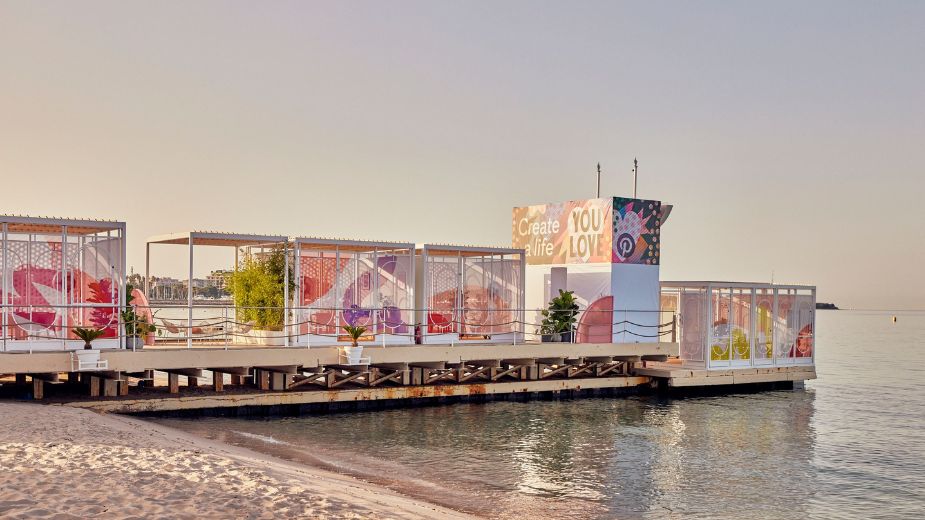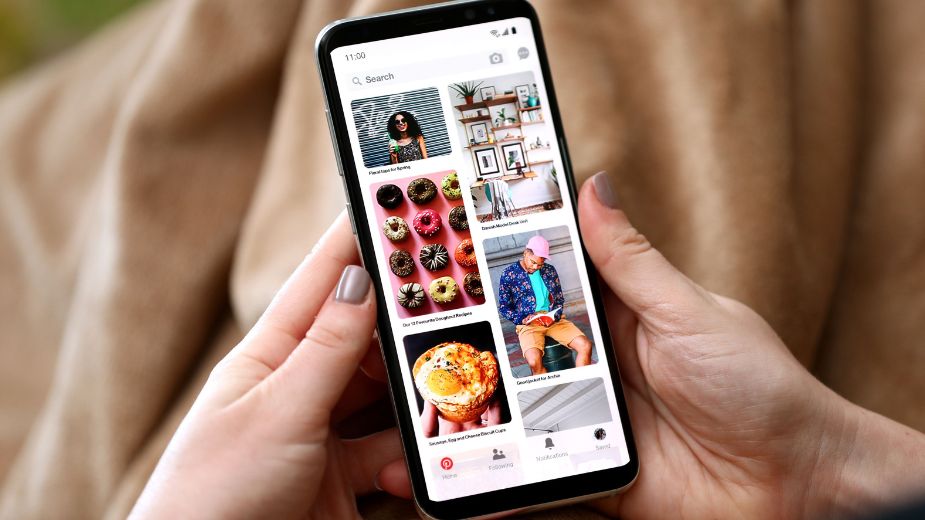
Why Pinterest Wants Us to Pop the Online Bubble

“We found out that people are spending upwards of 60% of their waking hours online… which blows my mind honestly.”
Andrea Mallard, chief marketing officer at Pinterest is in Cannes with her colleagues chief content officer Malik Ducard and chief revenue officer Bill Watkins. She’s surrounded by the intense azure of the Mediterranean sea, on a pier that’s been converted into a luxuriant makeshift meeting room. Pinterest has taken up residence on the Croisette with one of the most whimsical and playful beaches at Cannes, replete with hairdressers conjuring up bejewelled hairdoes, tattooists inking micro tattoos and a handy gift guide for Cannes souvenirs. It’s a candy-coloured confection that revels in its glorious surroundings, a temple to the fun of real life.
Surprisingly, perhaps, for an online platform, Pinterest’s guiding purpose is all about making our offline lives better. According to Andrea, the platform isn’t built around encouraging people to sink endless hours online - it’s about quality time, not quantity. She wants people to spend less time online - and to spend it better.
“The vast majority of people say that time is overall draining and that they think that the internet is actually kind of a dark and scary place that that makes them feel worse about their own life and makes them feel worse about what other people are doing by comparison. We said, what would happen if we created a place where we acknowledge what’s going on on the internet, but make it clear that this is a very different kind of online environment. We actually want brands and creators and pinteresters to hold us accountable because we want to create a very different experience where the focus is on you and doing things that are going to make them happy tomorrow.”

The platform has instituted a number of progressive policies and design decisions to that end. In 2018 it banned political advertising, to quell disinformation and divisive messages from unverifiable sources. It’s also designed its search and algorithm to support people struggling with difficult emotions - ‘compassionate search’ means that people looking for information about mental health issues don’t then find themselves trapped in a feedback loop of negativity.
At a time when other platforms seem to be preparing us for a future trapped in a virtual existence, Andrea says that that Pinterest is a place of inspiration. Above all else, they hope to inspire users to take action - whether it’s finding a craft idea to emulate, gather together a moodboard for a new tattoo or collate must-have details for a house renovation (in fact, Andrea challenged herself to do up her own house just using Pinterest boards).
That’s not to say that Pinterest is completely oblivious to web3 and the metaverse, it’s just that they want to see these technologies used in service of positivity and action. “We're not shying away from whatever new technology there is, but we're saying how do you apply it with someone's actual best interest in mind? As a result, I think we're we've created something pretty differentiated,” says Andrea,
When it comes to working with creators, that positive mentality is also notably unique. Chief content officer Malik Ducard joined Pinterest from YouTube, where he was VP of content partnerships. And the difference was palpable the minute he walked into Pinterest six months ago. The platform emphasises ‘positive connection’ and ‘inspired engagement’, shaping not only the kind of content Pinterest makes and creators it supports but also the way in which content is matched to users. Earlier in June, Pinterest announced a multi-year global partnership with media company Tastemade to create idea pins, content series and even live streaming.
“Algorithms are a choice; algorithms and systems are a design. At the floor, Pinterest has design the system to support this kind of connection,” he says. “I’d say the difference is that we are about creators that are inspiring creators, that are positive. We don’t want every creator - we want the creators who are doing the right thing. Showing pinners and viewers and users how to go from idea to actuality, from idea to ‘I did it’ - creators who are helping to lift up lives.”
One surprising outcome of all this emphasis on actionable inspiration and positive environments is that Pinterest is seeing a surge of usage from men. Stereotypically, the platform has an overwhelmingly female user base but men are one of the fastest growing audiences.
“Whenever I talk to brands, I say two things. One is that there are a lot of women and the first thing I say is, ‘you’re welcome’, because they control 85% of the purchasing decisions in almost every country and two, there are a lot of men who are looking for fashion ideas, who are looking for home ideas.”
Andrea says she suspects that men, especially young men, are turning to Pinterest for ideas to help them flourish. With the spotlight on male mental health and a growing gender gap in further education, the fact that platforms like Pinterest can offer a safe space where men can find advice around studying or careers, or even simply a place to express themselves.
From a brand perspective, Pinterest is hoping that a combination of brand safety and shoppability will attract advertisers. According to Bill Watkins, Pinners often proactively come to the platform to shop and to find items and experiences that they want to incorporate into their own lives. And when a user saves a pin, that often means they’re saving services or objects they intend to buy - whether that’s exciting ingredients for an experimental dinner or fancy bookshelves for a new home.

‘We have like 400 billion pins, organised into seven billion boards. Understanding tastes - we've turned that into a math problem but it shows up in such a natural positive, brand safe environment.... It's a very personal experience. We want to make it easy for someone to shop and we feel like we're making a lot of good progress here,” says Bill, who reveals they’ve launched a beta roll out with Shopify merchants and are looking to bring creators and commerce closer together. To that end, during Cannes, the Pinterest team also launched ‘Idea Ads’.
But it’s not just brands that feel safe, Malik says that Pinterest takes the safety of the creators that use its platform seriously. “We hear from content creators that Pinterest is a safe place for them. I didn’t hear that in other places. ‘I feel safe in the comments’ is not a thing on the internet, but it’s a thing that Pinterest is focused on,” says Malik. It’s not a platform that fosters spats and beefs between creators - which is, afterall, another negative waste of time for makers and users.
Ultimately, says Andrea, the platform has been walking its own path and hopes to provide an alternative to what else is out there in terms of online environments.
“It's actually pretty unequivocal that people are saying: ‘I'm feeling like I'm getting sucked in. I feel like the algorithm is more powerful than me’. And it is, actually. So we have a lot of people who are coming to us saying: ‘I need this. You are an online oasis .... because I, for some reason, feel better after I've spent time on Pinterest’. And that's not an accident.”













